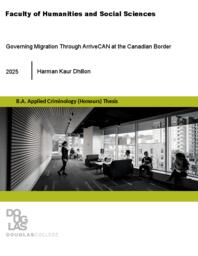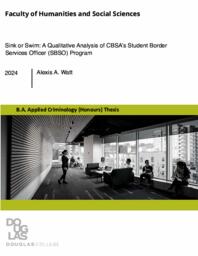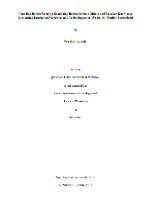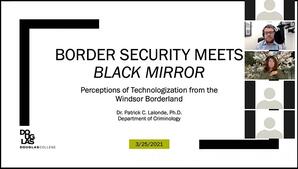Lalonde, Patrick C.
Person Preferred Name
Patrick C. Lalonde
Position
Faculty Member
Field of Activity
Canadian border security
surveillance
policing
technologization
simulation of migration/mobility
Email/Contact
lalondep@douglascollege.ca
Department
Status
current
Affiliation Date
2020
Education and Credentials
PhD (University of Waterloo)
M.A. (University of Windsor)
Experience includes prior work as a border services officer through FSEWP with Canada Border Services Agency as well as in-depth institutional analysis of CBSA policies and training practices. Currently serving as a Provincial Board Member on the New Westminster Police Department Police Board and as a Director on the BC Association of Police Boards.
Research interests include Canadian border security, surveillance, policing, and technologization and simulation of migration/mobility.
PhD (University of Waterloo)
M.A. (University of Windsor)
Experience includes prior work as a border services officer through FSEWP with Canada Border Services Agency as well as in-depth institutional analysis of CBSA policies and training practices. Currently serving as a Provincial Board Member on the New Westminster Police Department Police Board and as a Director on the BC Association of Police Boards.
Research interests include Canadian border security, surveillance, policing, and technologization and simulation of migration/mobility.
Related Works
Content type
Digital Document
Description / Synopsis
This study sought to examine the construction of the ArriveCAN app that was used during COVID-19, and added to the interdisciplinary and criminological literature relating to the digitization of the border in relation to these constructions and uses of the ArriveCAN app.
Origin Information
Content type
Digital Document
Abstract
Each summer, hundreds of Canadian post-secondary students are recruited by Canada Border Services Agency (CBSA) under the Federal Student Work Experience Program (FSWEP) to become Student Border Services Officers (SBSOs). In a paid, non-union role, students act in similar capacities to full-time Border Services Officer (BSO) labour. This thesis provides an in-depth analysis of the never before examined SBSO program in an academic context. Through qualitative interviews conducted with former SBSOs, a wide range of issues were uncovered, from low wages to poor culture, in addition to the challenges and tribulations associated with the examination of insular organizations, such as CBSA.
Origin Information
Content type
Digital Document
Abstract
This article combines findings concerning institutional discourses with knowledge of frontline officials and non-officials gleaned from qualitative interviews with border services officers (BSOs) and travelers living and working in the Windsor, Ontario, Canada borderland to discuss the technologization of modern Canadian borders. Findings generated from interview data reveal that both frontline officials and non-officials experience a border where the personal narrative and performativity of the embodied subject traveler is increasingly irrelevant, with officer decision-making supplanted by information contained in databases. Findings also explore various dangers associated with increased simulation and cyborg work, including database errors having demonstrable consequences on the mobility and rights of human beings; the colonization of the lifeworld of BSOs by digitized risk technologies ultimately rendering officers incapable of asking questions, looking for indicators, and making informed decisions on the basis of anything other than databases; and the associated human rights, privacy, and legal implications that are potentially wide-ranging and extremely troubling.
Origin Information
Content type
Digital Document
Abstract
This thesis contributes to the criminological (especially the policing and security) and governmentality literature by examining constructions of security found in the Action Plan on Perimeter Security and Economic Competitiveness consultation process. In analyzing responses via a discourse analysis, this thesis identifies how security was constructed in the Action Plan vis-a-vis the various interest groups involved in the Action Plan consultation process. The research concludes that the discourses presented in the Action Plan systematically differ in patterned ways from discourses identified in the consultation process. The discourses found in the Action Plan contribute to an overwhelmingly neo-liberal and economic construction of security. These findings contribute to governmentality literature by identifying a need to examine beneath official texts in identifying discourses. As well, these findings provide an impetus for future research to move beyond pre-conceived constructions of security to instead examine security in case-specific contexts.
Origin Information
Content type
Digital Document
Abstract
Through contrasting institutional discourses with frontline official and non-official knowledge gleaned from interaction narratives from past social interactions and supplied by border services officers (BSOs) and members of travelling publics circulating at ports of entry in the Windsor, Ontario, Canada borderland, this thesis accomplishes the work of considering border security and mobility governance as an everyday practice (Côté-Boucher, Infantino, and Salter 2014). While previous literature has expertly documented the governmentality of modern borders, its privileging of institutional forms of knowledge means findings are inherently limited in that they ignore subjugated forms of knowledge (Foucault 1972), the role of diverse publics in shaping the field of (in)security, and renders invisible the presence of (in)security in everyday life (Vaughan-Williams and Stevens 2016:43). To this end, this thesis is unique in considering – for the first time – interaction narratives supplied by BSOs and members of travelling publics circulating regularly within a geographically specific borderland. This thesis is also unique in considering how knowledge generated by such narratives potentially challenges institutional discourses supplied by Canada Border Services Agency (CBSA). Lastly, this thesis is also unique in examining how border technologization and digitization potentially influence frontline social interactions between officers and publics, generate additional knowledge concerning the nature of digitized borders, and function to establish a gulf between institutional discourses and localized frontline practices.<p>This thesis employs a multi-method approach, utilizing: 1) a content analysis and discourse analysis of various primary and secondary institutional documents, 2) content and thematic analyses performed on transcripts generated from in-depth, semi-structured interviews performed with 10 BSOs working in the Windsor borderland, and 3) content and thematic analyses performed on transcripts generated from in-depth, semi-structured interviews performed with 30 members of travelling publics, the vast majority of whom resided in the Windsor borderland at the time interviews were conducted.<p>Combined, official and non-official knowledge generated from interaction narratives provided by participants provides several critiques in terms of analyzing institutional knowledge generated by CBSA. Findings generated through interaction narratives indicate: 1) officers have experienced a shift in “lifeworld” (Habermas 1981) alongside shifts in agency mandates toward a neoliberal risk-management model of mobility governance; 2) officers receive very little formal training in terms of frontline interactions; 3) officer training displays a systematic bias toward constructing all interactions as “security moments” designed to fulfill a security mandate, ultimately leaving officers ill-trained in terms of the “facilitation” (CBSA 2018e:8), non-securitized, humanitarian side of border work; 4) despite being couched by CBSA institutional discourses as being professional, courteous, law-abiding, and thorough, much evidence exists to suggest BSOs act in ways differing substantially from this knowledge, including: officers not performing full primary inspections on travellers, Canadian Charter of Rights and Freedoms violations in terms of officers routinely asking travellers about their mobility while outside of Canada, and a variety of negative frontline interactions including: a) aggressive or unnecessary questioning by officers, b) officers presenting a rude or unfriendly demeanor, c) harassment by officers about purchases made abroad, d) officers unfairly or incorrectly applying policies, e) unnecessary examinations, and f) enforcement actions resulting in the seizure of purchased goods; 5) officers are often forced to develop shared ad hoc best practices in terms of social interactions on the frontline, where there is a real danger of BSOs “parroting” the poor practices of just one or two veteran officers; 6) the existence of a substantial gulf between national policy and training modules and the localized and geographically-specific practices occurring at disparate ports of entry across Canada.<p>Findings generated in terms of the technologization of contemporary borders suggest border security and mobility governance practices are best understood as forms of simulation (Baudrillard 1981) and cyborg work (Bogard 1996), whereby digitized subjects (Goriunova 2019) – which are not at all representative of human subjects – are taken as irrefutable copies or “dividuals” (Deleuze 1992) by border officers, and ultimately become the unit of analysis under neoliberal risk-management schemes in making decisions possible and rendering the personal narratives and performativity of embodied subjects (travellers) effectively irrelevant. Despite CBSA institutional documents couching technologization in terms of improving efficiency at the border, augmenting officer decision-making, and enhancing security provision, official and non-official knowledge gleaned from interaction narratives generated from perceptions related to past social interactions serves to provide a serious critique of these discourses. This includes knowledge concerning perceived deficits related to border technologization, including: 1) discussions of data errors causing travel problems (duplicated NEXUS card numbers, mistaken warrants in the CPIC database, false travel histories in customs databases, and so forth); 2) the advertised benefits of the NEXUS trusted traveller program (efficiency crossing borders) as being either non-existent or irrelevant; 3) the use of Automated Border Clearance (ABC) kiosks / Primary Inspection Kiosks (PIKs) at major Canadian international airports as serving to produce superficial and robotic frontline social interactions guided exclusively by computer-generated risk codes; and 4) the apparent negative effects of technologization in terms of eroding the ability of officers to make informed decisions on the basis of anything other than information provided by computerized databases.<p>Combined, findings generated by comparing institutional knowledge with official and non-official interaction narrative knowledge are subsequently considered through the lens of simulation, human and mobility rights, bureaucratic secrecy, and potential policy change. Additionally, slippage between nationalized institutional discourses and localized frontline practices are explained through the lens of neoliberal systems of power and governance. Finally, avenues for future research are discussed in concluding the thesis.
Origin Information
Content type
Digital Document
Abstract
The second edition of "Questioning Sociology: Canadian Perspectives" offers a collection of twenty-three readings that encourage students to challenge commonplace assumptions and to reflect critically on the social world they inhabit. Contributed by prominent Canadian scholars, these readings explore provocative sociological questions and are designed to lead students into debates about key social and theoretical topics. Also covering a number of important Canadian issues, including sovereignty for Quebec and Indigenous peoples, maritime economic transition, and immigration and citizenship, this text prompts students to engage thoughtfully with issues that are relevant to their lives. In doing so, it encourages readers to develop a critical 'sociological imagination'. This edition features new chapters on family, mental illness, the environment, women in prison, media, and 'deserted questions' in sociology. Covering a range of important sociological topics and offering highly accessible pedagogy, this text is ideal for students who are new to the study of sociology.
Origin Information
Content type
Digital Document
Abstract
Objectives:<p>Replicate previous experimental findings on the causal effect of deviant peer modeling and assess whether the gender of peer models is an important determinant of theft.<p>Methods:<p>A randomized control trial (n = 329 university students) in which participants were randomly placed into one of four deviant peer modeling groups (control, verbal prompting, behavioral modeling, verbal prompting plus behavioral modeling) and one of three confederate gender similarity groups (same gender, different gender, mixed gender) (4 × 3 factorial design, equal randomization). The outcome was theft of a gift card. Each session included two confederates and a single participant. This feature reduced measurement error over more common approaches where groups of participants take part in the study at the same time and in which uncontrolled interactions and/or threshold effects may act as confounders.<p>Results:<p>Participants were more likely to steal when exposed to confederates who behaviorally modeled theft (15.1% stole) or offered verbal support for theft and modeled it (11.1%) compared to controls (2.5%) or when confederates only talked about stealing (1.2%) (p = .001). Participants exposed to same-gender peers (7.3%) were as likely to steal as those exposed to different gender peers (5.5%) or mixed-gender peers (9.9%) (p = .464).<p>Conclusions:<p>Behavioral modeling was found to be an important determinant of theft. This replicates previous research in the area and offers arguably the strongest support to date for the influence of deviant peer modeling. Peer gender, however, was not found to be an important etiological component of theft. External validity is a limitation.
Origin Information
Content type
Digital Document
Abstract
Much recent research has focused on examining various binary contradictions and employing metaphors pertaining to border security. Ultimately, this article argues that existing debates and metaphors are inadequate in describing what is understood and agreed upon in the literature in terms of borders. This article proposes a refinement of existing theory for contemporary borders, employing Baudrillard’s concept of ‘simulation’. The metaphor of the ‘simulated border’ functions to avoid debates surrounding geospatiality while also incorporating aspects of risk society and control in concluding that borders are anything but organic security environments, with the ‘stretched screens’ of border agents serving to produce dividuals that are tested within games of security to govern mobility anywhere in time or space.
Origin Information
Content type
Digital Document
Abstract
While recent scholarship has begun the difficult task of unpacking the sociology of frontline border policing, literature examining how frontline border officers are governed through training and organisational governance technologies is sparse (particularly in terms of how officers are trained to interact with and form perceptions of the public they serve). This article provides the first concrete examination of border officer training by conducting a Foucauldian discourse analysis of various officer training and other documents to determine the contours of organisational governance technologies and how they serve to guide border services officers (BSOs) employed by Canada Border Services Agency in interacting with and perceiving of members of the travelling public. Findings indicate that governance technologies include training documents, manuals, public policy, and a bifurcated agency governance hierarchy serving to enable, support, and constrain BSO frontline duties, public interactions, as well as potentially perceptions. Findings also reveal that officers receive very little training related to interacting with members of the travelling public on the frontline. Officers also receive very little instruction related to how they should prioritise their disparate duties related to interacting with the travelling public. Findings ultimately indicate that when training is present, governance technologies – alongside recent shifts in agency organisational governance – contain systematic biases that produce officer worldviews and social interactions that are rooted exclusively in security provision, while leaving BSOs without the tools necessary to handle other types of public interactions that regularly occur at the border.
Origin Information
Content type
Video
Description / Synopsis
Presented at the DC Research Café: HiPE Committee (March 25, 2021).
Origin Information










